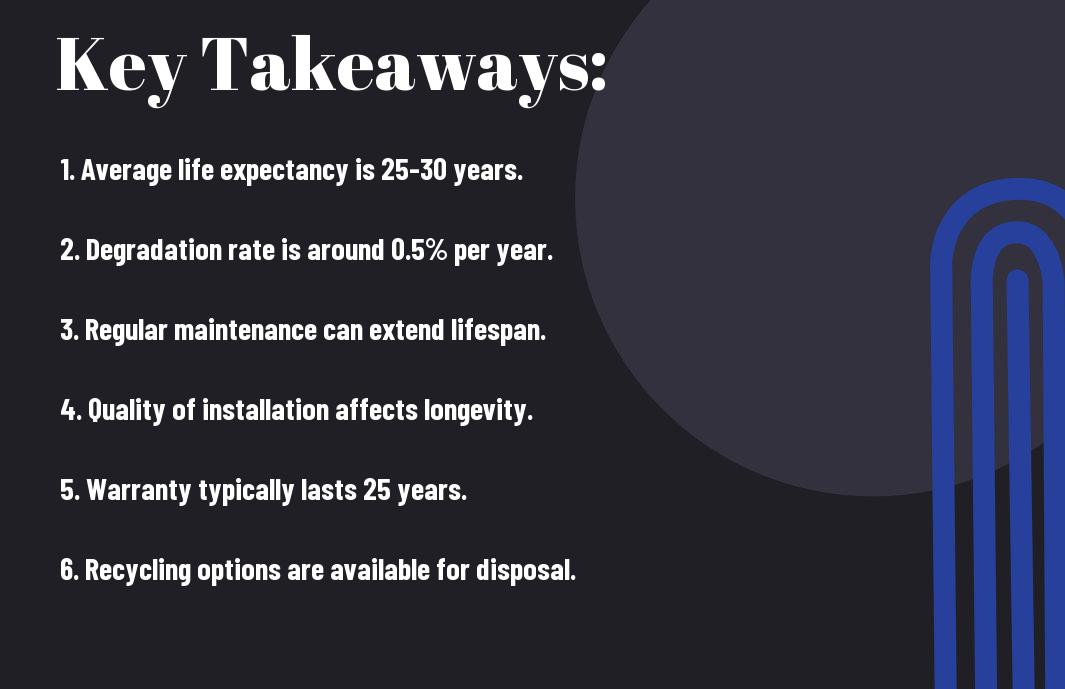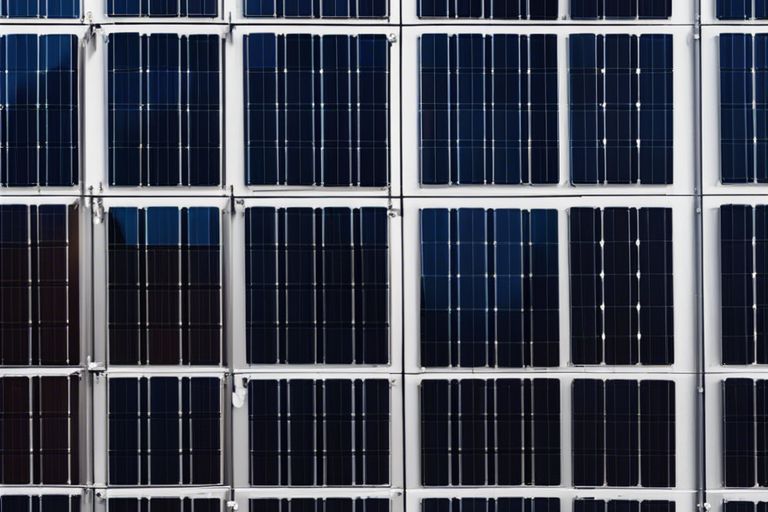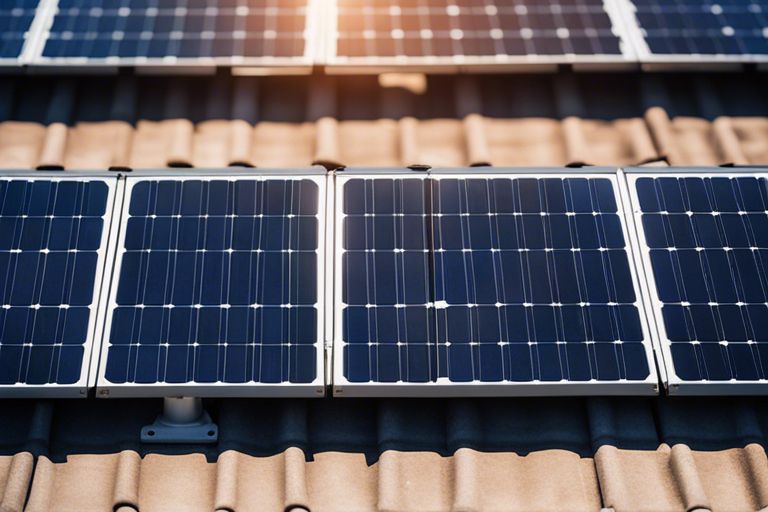You may find yourself wondering about the longevity of solar panels as you consider transitioning to solar energy. Solar panels are designed to be durable and long-lasting, with the average life expectancy ranging from 25 to 30 years. Factors such as quality of materials, maintenance, and proper installation play key roles in determining how efficiently your solar panel will function over its lifetime. Understanding the life expectancy of a solar panel can help you make an informed decision when investing in renewable energy for your home.
Key Takeaways:
- Life expectancy: The average life expectancy of a solar panel is around 25-30 years.
- Performance degradation: Over time, solar panels may experience slight performance degradation, typically around 0.5% to 1% per year.
- Warranty: Most solar panel manufacturers offer warranties ranging from 20 to 25 years, guaranteeing a certain level of performance over time.
- Maintenance: Proper maintenance, such as regular cleaning and monitoring, can help extend the lifespan of solar panels beyond the expected 25-30 years.
- Recycling: At the end of their lifespan, solar panels can be recycled to recover valuable materials and minimize environmental impact.

The Basics of Solar Panels
How Solar Panels Work
With the growing interest in renewable energy sources, solar panels have become increasingly popular in recent years. These panels work by harnessing the sunlight and converting it into electricity through a process called the photovoltaic effect. When sunlight hits the solar panels, the photons in the light are absorbed by the cells in the panels, knocking electrons loose and generating an electric current.
Types of Solar Panels
Solar panels come in different types, each with its own advantages and disadvantages. The most common types of solar panels are monocrystalline, polycrystalline, and thin-film panels. Monocrystalline panels are known for their efficiency and sleek appearance, while polycrystalline panels are more affordable but slightly less efficient. Thin-film panels are lightweight and flexible, making them ideal for certain installations.
- Solar panels come in various types, including monocrystalline, polycrystalline, and thin-film panels.
- Each type has its own set of advantages and disadvantages, so it’s important to choose the right one for your specific needs.
It is important to understand the differences between these types of solar panels to make an informed decision when investing in a solar energy system. Knowing which type is best suited for your home or business can help you maximize the efficiency and effectiveness of your solar panel installation.
Factors Affecting Life Expectancy
There’s a range of factors that can influence the life expectancy of solar panels. These factors can be broadly categorized into environmental factors, quality of manufacturing, and maintenance and repair.
Environmental Factors
- Sunlight intensity and duration
- Temperature fluctuations
- Humidity levels
Any changes in these environmental conditions can impact the efficiency and longevity of your solar panels. It’s important to consider these factors when installing solar panels to maximize their lifespan.
Quality of Manufacturing
Life expectancy of solar panels can also be influenced by the quality of their manufacturing. Choosing panels from reputable manufacturers known for their high-quality materials and craftsmanship can result in longer-lasting and more durable solar panels.
A key aspect of quality manufacturing lies in the materials used. High-grade materials such as monocrystalline silicon are more durable and efficient, ensuring that your solar panels will have a longer life span.
Maintenance and Repair
Maintenance plays a crucial role in ensuring the longevity of your solar panels. Regular inspections, cleaning, and prompt repairs of any damages can help extend the life expectancy of your solar panels.
Another important factor to consider is the expertise of the maintenance and repair technicians. Proper training and experience in handling solar panels can make a significant difference in how well your panels continue to perform over time.

Average Life Expectancy of Solar Panels
Despite being a relatively new technology, solar panels have proven to be durable and long-lasting energy solutions. The average life expectancy of solar panels is typically around 25-30 years. However, some panels can last even longer with proper maintenance and care.
Industry Standards
Solar panels are designed to withstand harsh weather conditions and temperature fluctuations, ensuring they continue to produce energy efficiently over their lifespan. Industry standards dictate that solar panels should still be operating at around 80% of their original efficiency after 25 years, highlighting their durability and reliability.
Real-World Examples
Life expectancy can vary based on the quality of the panels and the installation process. In some cases, solar panels have exceeded their expected lifespan and continued to produce energy effectively for decades. This speaks to the robust design and engineering that goes into manufacturing these renewable energy systems.
With advancements in technology and ongoing research, the life expectancy of solar panels is expected to increase in the coming years, making them an even more sustainable and long-term energy solution for your home or business.
Degradation Rates
Initial Degradation
Many factors can influence the initial degradation of solar panels. Any manufacturing defects, installation issues, or external environmental factors can cause a slight decrease in performance right from the start. It is crucial to ensure that your solar panels are properly installed and maintained to minimize any potential early degradation.
Long-Term Degradation
Degradation of solar panels over the long term is typically a gradual process. While modern solar panels are designed to be durable and have a long lifespan, they can still experience a decrease in efficiency over time. Factors such as exposure to sunlight, temperature fluctuations, and weather conditions can all contribute to the long-term degradation of your solar panels.
Degradation of solar panels over time is usually measured in terms of the panel’s degradation rate, which indicates how much the efficiency decreases each year. It is necessary to be aware of these degradation rates to have a better understanding of how your solar panels will perform over their lifespan.
Factors Influencing Degradation
- Sunlight exposure
- Temperature fluctuations
- Weather conditions
Degradation of solar panels can vary based on a variety of factors, including the amount of sunlight they receive, the temperature fluctuations they endure, and the prevailing weather conditions in your area. By considering these factors, you can better predict and manage the degradation of your solar panels over time.
Factors Influencing Degradation
- Panel quality
- Maintenance and cleaning
Long-term degradation of solar panels can also be influenced by the quality of the panels themselves and how well they are maintained and cleaned. By investing in high-quality panels and implementing regular maintenance practices, you can help slow down the degradation process and prolong the lifespan of your solar energy system.

Extending the Life of Solar Panels
Regular Maintenance
For keeping your solar panels in top condition and extending their lifespan, regular maintenance is necessary. According to a study on the lifespan of solar panels conducted in the UK by GreenMatch, regular maintenance can significantly impact the longevity of your solar panels. You can learn more about this in GreenMatch’s article on How Long Do Solar Panels Last? Lifespan in the UK.
Cleaning and Inspection
Solar panels require periodic cleaning and inspection to ensure optimal performance. Dust, dirt, bird droppings, and other debris can accumulate on the surface of the panels, reducing their efficiency. Cleaning the panels with a gentle soap solution and water can help remove any buildup and maintain their effectiveness. Regular inspections for any signs of damage or wear are also crucial in preventing any potential issues that may arise.
Inspecting the connections, mounting racks, and wiring of your solar panels is important to identify any loose connections or corrosion that could affect their performance. By addressing these issues promptly, you can prevent more significant problems and prolong the life of your solar panels.
Upgrading and Replacement
The technology behind solar panels is constantly evolving, with new advancements being made regularly. Upgrading your solar panels to newer, more efficient models can not only improve their performance but also extend their lifespan. Additionally, if your current solar panels are reaching the end of their useful life, considering replacement with newer, more durable panels can be a wise investment in the long run.
This proactive approach to upgrading and replacing your solar panels ensures that you are harnessing the full potential of solar energy and maximizing the lifespan of your system. By staying current with the latest advancements in solar technology, you can continue to benefit from clean, renewable energy for years to come.
Manufacturer Warranties and Guarantees
Typical Warranty Periods
Unlike some other products, solar panels come with solid warranties from manufacturers. Typically, you can expect a warranty period ranging from 20 to 25 years. This means that your panels are guaranteed to operate at a certain level of efficiency during this time frame.
What’s Covered and What’s Not
Manufacturer warranties usually cover issues such as manufacturing defects, premature wear and tear, and a decrease in power output below a certain threshold. However, it’s crucial to read the fine print as some warranties may not cover damages caused by external factors like extreme weather conditions or improper installation.
The warranty is clear and outlines what the manufacturer will replace or repair in case of any issues. Typically, the cost of labor is not covered, so you may need to factor in those expenses if any problems arise.
Final Words
So, when considering the life expectancy of a solar panel, it’s important to remember that these remarkable pieces of technology are designed to last for decades. The average lifespan of a solar panel is around 25-30 years, making them a durable and long-term investment for your energy needs. With proper maintenance and care, your solar panels can continue to provide clean and renewable energy for your home or business for many years to come. For more information on the longevity of solar panels, you can check out How Long Do Solar Panels Actually Last?.
Q: What is the average life expectancy of a solar panel?
A: The average life expectancy of a solar panel is typically around 25 to 30 years. However, many solar panels can continue to produce electricity beyond this timeframe, but at a reduced efficiency.
Q: What factors can affect the life expectancy of a solar panel?
A: Several factors can impact the life expectancy of a solar panel, including the quality of the panel, the climate it is exposed to, maintenance practices, and the frequency of use. Proper installation and regular maintenance can help extend the lifespan of a solar panel.
Q: How can I maximize the life expectancy of my solar panel?
A: To maximize the life expectancy of your solar panel, you should ensure it is installed correctly by a qualified professional, regularly clean and inspect the panels, and promptly address any issues that arise. Additionally, investing in high-quality panels and components can help ensure a longer lifespan for your solar panel system.
